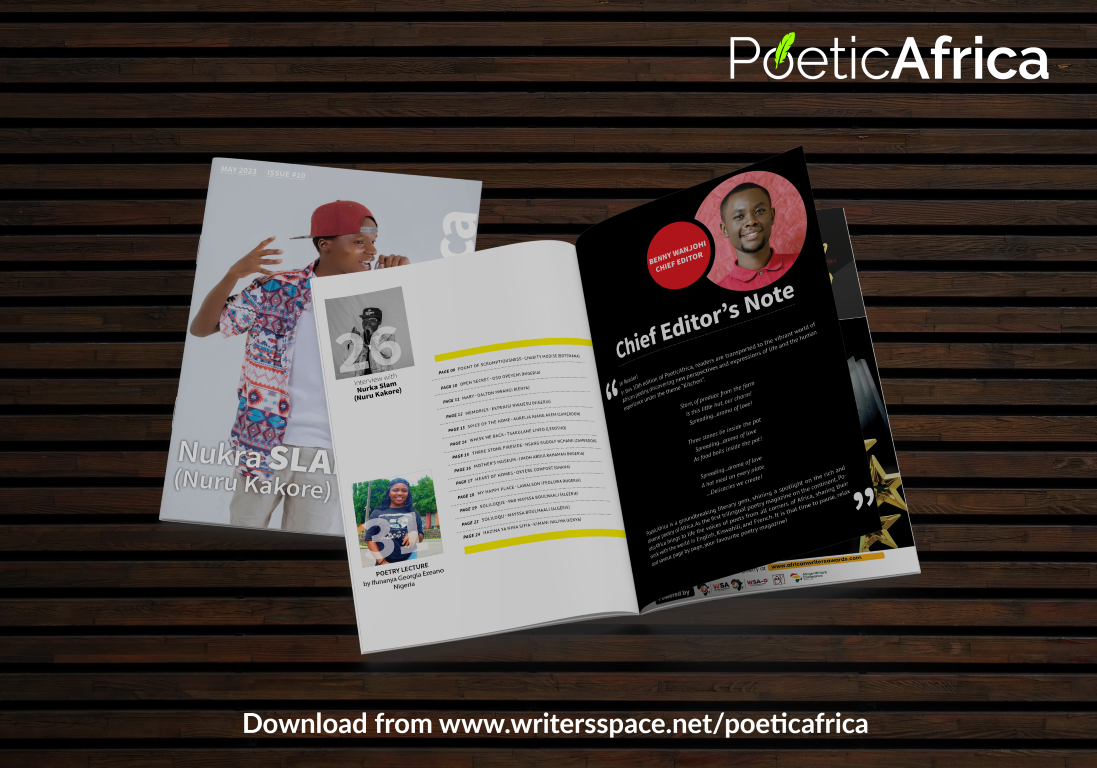
Interview by Elizabeth Akunyili (Nigeria) and Sandra Nadege (Kenya)
Welcome Nurka to our interview seat. I am glad to host you today as you share with us your poetry journey, lessons learnt through the years, collaborations made, achievements and failures if any. Please start by telling us how you first got interested in poetry, and what inspired you to start writing?
I started to take an interest in poetry after several passages in different artistic disciplines, including writing; rap then slam poetry; For me the slam is a crossroads of almost all artistic disciplines; When you are a slammer you are both a writer; rapper; dancer; musician and storyteller.
My love for this art is due to its greatness; I used to say that I do the slam to express myself and specially to take precedence. I can’t just pick one source of inspiration on the writing side since I was writing everything that came to my mind, such as an experience, a story that touched me during the day, a difficult situation I faced or a victory that marked me. I just wanted to write because my mantra is that the one who does not write easily forgets.
Who are some of your biggest influences when it comes to poetry, and why?
As I said before, I started writing after I did rap and therefore my first model in terms of writing is a group of rappers named La Ligue composed of Youssoupha, Medine and Kerry James. I chose them because they write like slammers; they are Rapper slammers. Their writing is about African realities. I am also influenced by Grand Corps Malade and Saul Williams because they are precursors of slam in France and in the United States respectively.
Read – Interview with Funminiyi Akinrinade “Esv_Keks”
Can you describe your writing process, from idea generation to a finished product?
At the beginning of my career I always started by having a title of the text that I wanted to write. I would then develop different ideas which I would give a systematic order from my mind. I would then write them on paper while modifying the sentence construction. Afterwards I would present to a group of friends for peer review and make any necessary adjustments from the feedback. After a second peer review, I would make the final adjustments and have the final text.
Now, with experience, I manage to follow three steps; have a title, theme and the message that the poem should convey, then write a draft and present to a group of friends for peer review as I come up with the final poem.
I like how systematic you are. I think most poets possess this quality. How do you know when a poem is finished, and what is your editing process like?
I know a poem is over when I am satisfied with the end result because I believe that you have to be your first fan. Then when all my poet friends have validated the poem because I believe we write for others and if they should love our work. Finally, when the public has appreciated the poem.
Can you talk about any particular challenges or obstacles you’ve faced in your poetry career, and how you overcame them?
Mostly I struggle with lack of time, writer’s block, trying to find opportunities to publish or present my work and receiving negative reviews. I overcome these obstacles by looking for inspiration through various sources such as books, movies, nature or current events as well as looking for constructive feedback to improve my work.
What is your favourite poem that you’ve written, and why?
“Happiness and Money” is my favorite poem because it is a rather philosophical text and we live it every day. At the beginning of each performance of this poem, I always ask the public, “What would you choose between money and happiness?” I tend to think that those who are mean choose money (ha-ha), the intelligent choose happiness and the geniuses choose both.
After my performance they all manage to understand why it is necessary to choose both. One can never work without the other. The question applies to a man who after an accident has to choose amputation of his left or right leg. To walk we need both legs.
That’s intelligent, I am already inspired. How do you decide which topics or themes to write about in your poems?
I really can’t say that I have a very specific method for choosing subjects from my texts because they spontaneously come to mind by listening to music, by reading a book or perhaps observing a very specific fact in society.
Can you describe your writing style, and how it has evolved over time?
I adopt different writing styles for different poems according to the message I want to convey. Constructive comments and reviews from other poets or readers has gradually helped me to improve.
That sounds nice. Not so many receive critiques or reviews so positively. How do you incorporate feedback and critiques into your writing process?
When I receive comments or reviews about my poems, I take them into consideration and carefully evaluate them. I take into account constructive comments to improve my poems and refine my poetic voice. However; I am also aware that I must remain faithful to my own artistic vision and to my poetic voice and not let others’ comments divert my creativity.
How do you promote your work, and what has been the most effective method for you?
I promote my work using social networks by participating in poetry events and regularly publishing poems in magazines and anthologies. The most effective method for me was to participate in poetry events and competitions. This allowed me to establish contacts with other poets and to make my work known.
Soma Mazungumzo na Christina Lwendo
Can you talk about any notable achievements or accomplishments in your poetry career so far?
I had the chance to publish several collections of poetry in my community. I am particularly proud to be the founder of the Kigali Slam Poetry of course with the help of other poets, in particular Axel Web Slam, Fefe Kalume, ACSA Sifa, Carine Poète and Linda Maroy (Elizabest Poetry).
How do you stay motivated and inspired to keep writing?
It’s simple. I read and listen to a lot of poetry. I immerse myself in nature and I am looking for new experiences to stimulate my creativity. I write every day, read and never forget my early motivation.
How do you incorporate personal experiences and emotions into your poetry?
I try using evocative images and metaphors to communicate my feelings. I like to write about universal human experiences that can affect people from different cultures and from different regions of the world.
Can you discuss any collaborative projects you’ve worked on with other poets or artists?
I have worked on many collaborative projects with other poets and artists over the years. I participated in collective anthologies, poetry events and multimedia artistic projects that involved collaborations with musicians, dancers and visual artists.
What can readers expect from your upcoming works, and what are your future plans for your poetry career?
Readers can expect to be inspired, moved, and maybe even overwhelmed by my words. I have future plans to publish books, give public readings, organize slam events and participate in poetry festivals.
Lisez – Une conversation avec Eloga Arsène
What advice would you give to aspiring poets who are just starting out?
For the aspiring poets who are just beginning, I would advise them to start by loving poetry: to love reading and writing because writing comes from reading. It is also important to give yourself the time and space to write; find a support group or peers to share poems and reviews. Additionally, to persevere even when creativity is down.
Let us delve a bit into the organization that you founded. How did you first become involved with Kigali Slam Poetry, and what motivated you to start the collective?
Kigali is my second city after Goma. I spend almost all my holidays there. The slam was an idea that I developed unexpectedly during one of the holidays. Fortunately, I was able to meet the poets I mentioned above and together we founded slam poetry since we all loved art.
Can you talk about the goals and mission of Kigali Slam Poetry, and how it has evolved since its inception?
Kigali Slam Poetry (KSP) is a collective of poets, musicians and dancers seeking to promote and celebrate oral poetry and slam in Rwanda. The collective encourages emerging artists and offers a platform for them to express themselves. Our mission is to create a community of poets, musicians and dancers; to promote creativity; self-expression and cultural diversity. Since its creation, the collective has evolved to include regular slam events and workshops for young poets.
Can you discuss any future plans or projects for Kigali Slam Poetry, and how you hope to continue to grow and evolve the collective?
Our future projects include organizing larger and more frequent slam competitions, expansion of workshops for young poets in schools and local communities and building partnerships with external organizations to promote poetry and public speaking. The collective hopes to continue as a community of poets and artists of the word, while maintaining a commitment to diversity and inclusion.
What are some of the biggest challenges facing poetry and the arts in Rwanda, and how do you think Kigali Slam Poetry can help address these challenges?
The greatest challenges poetry and arts face in Rwanda are lack of funding and resources for artists, lack of support from cultural institutions, as well as lack of opportunities for artists to perform and promote their work. Kigali Slam Poetry can help address these challenges by providing opportunities for artists to connect with other artists, collaborate with cultural organizations and perform at slam poetry events organized by the collective. In addition, the collective can also play an important role by raising public awareness of the value of poetry and the arts, and encouraging support for the wider artistic community in Rwanda.
As you’re from the Democratic Republic of Congo but currently operating in Rwanda, do you think art and poetry is perceived differently in the two countries?
Though they are neighboring countries, art and poetry are probably perceived differently in the Democratic Republic of Congo and Rwanda. Although there are similarities in forms of artistic expression, the cultural influences and experiences of artists may be different from country to country. Perceptions of art and poetry can also vary depending on cultural traditions, historical contexts and socio-economic contexts of both of these countries.
One last question, how do you think poetry can make a positive impact in the world?
Poetry can have a positive impact in the world by expanding our perception, our sensitivity and our emotional sense and by transforming ourselves so that we become smarter.







